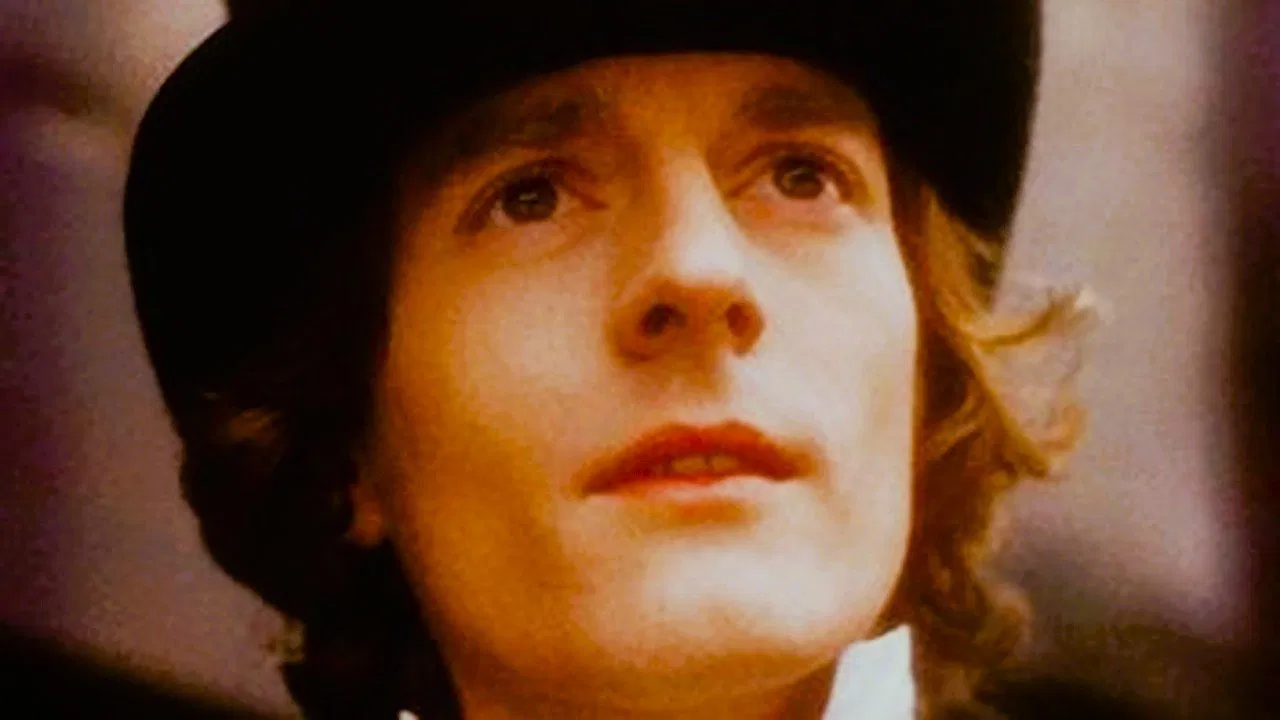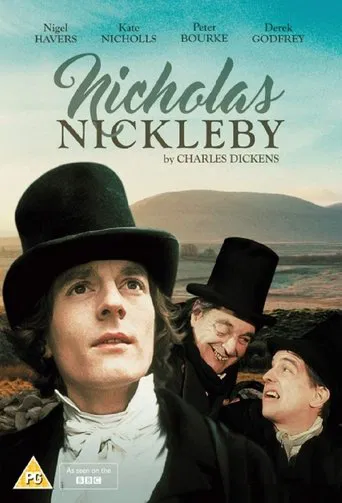

The book is, as ever with Charles Dickens, an absorbing and interesting read if somewhat sprawling in structure. This 1977 adaptation is fine generally as an adaptation and it does very well on its own terms. In regard to Dickens adaptations, it's neither among the best or worst ever- sort of the very solid but flawed kind- but of Nicholas Nickleby it is one of the better ones. A couple of scenes especially the Matilda Price tea party scene did agreed seem underwritten, and the adaptation can feel rushed. The book has a lot going on, and the adaptation while mostly fine could have done with more time to breathe to develop things more. Two performances didn't seem quite there, Kate Nicholls spent a lot of her screen time looking lost and Anthony Ainley plays Sir Mulberry Hawk far too broadly.But the rest of the performances are fine though, the secondary characters are somewhat caricatures anyway but the actors, some with stage experience, give them their all. Freddie Jones and Patricia Routledge are particularly worth looking out for. Nigel Havers plays Nicholas with sincerity and hot-headedness, he is in a way too old for the character but when he plays him so well it doesn't matter. Peter Bourke's Smike is extraordinarily moving, Derek Francis is a menacing Wackford Squeers and Hilary Mason is outstanding as Mrs Nickleby(not many other adaptations of the book have written Mrs Nickleby as well as here as well). Derek Godfrey's Ralph Nickleby is commanding and complex, I interpreted the reason for Ralph's suicide to be because of the thought of his only son dying hating him, this said this is clear in the book but could have been a little more in the adaptation. The Cheerybles could have been problematically played, agreed it is because the characters are impossibly good, but very nicely filled actually.It is a very well made and slickly directed adaptation too, skilfully shot with nothing unnatural about it. The countryside views and sets are breathtaking and true to the period, nothing too clean or bleak here, and the towns, houses and costumes are very well-thought out. The music is kept at minimum, to the point it's barely used. Considering though that the narrative changes around tonally a lot that was a very good decision to make. The dialogue is literate, with the comic elements funny, the sinister elements suspenseful and the heartfelt drama poignant. Very Dickenesian too in flavour. The story is compelling, faithful and easy to follow, just that because of the sprawling structure and a tendency to be rushed there are moments of choppiness here and there.Overall, flawed but very good and works generally works adaptation-wise too. 8/10 Bethany Cox
... View MoreThis is the most faithful and comprehensive version of Nicholas Nickleby so far. It is also one of the creakiest. The two are not unconnected.Dramatising early Dickens novels is always a challenge, because they retain much of the episodic structure of The Pickwick Papers. Although there is a clear plot thread running though Nicholas Nickleby much of the incident is tangential to it, at best. At the same time, the tone varies wildly from scene to scene. A chapter of great pathos is followed by one of bitter, angry satire, which in turn is followed by broad knock-about comedy.It is the same with the characters. The principle characters have a believable psychological complexity but the minor characters are often just comic grotesques.A producer has to decide whether to boil a Dickens book down to its essential elements and impose a unity of style in both staging and performance, or present it as written, with all its digressions and discordant elements. In the last twenty years or so, the convention has been to take the first approach, even if this means distorting the books slightly. This production opts for the second approach. It is faithful, but perhaps too much so.The performances are variable in both quality and type. Nigel Havers gives us a plausible Nicholas but doesn't seem quite right for the part. Nicholas is a bit of a hot-head but Havers doesn't really capture this. He acts as he is required to act, but his behaviour seems to be dictated by the story rather than arising naturally from the character.It is the same with Derek Godfrey's Ralph Nickleby. He fulfils the requirements of the plot, but has none of the depth and complexity that Christopher Plummer and Charles Dance later brought to the role. As a result, when Ralph commits suicide it is not clear why: was it remorse over Smike; the triumph of Nicholas; his financial ruin; his possible imprisonment? Who knows? Who cares?On the plus side, Hilary Mason's Mrs Nickleby is superb. She captures the character's garrulous wrong-headedness without letting her become too exasperating. Similarly, Peter Bourke's Smike is finely judged, believable and moving (perhaps the best I have seen) and Derek Francis's Sqeers rises above the over-emphatic make-up he is saddled with. Even the impossibly good Cheeryble brothers just about work. David Griffin and John Hewer play them very much as written without getting too bogged down in their fey, sentimental perkiness.The lesser characters are all over the place. Some are underplayed, others hammed up to the rafters. Freddie Jones retains the fruity theatricality of Mr Crummles but scales him down for the TV screen, whereas Malcolm Reid and Patricia Routledge play Mr and Mrs Mantolini at least as broadly as Dickens wrote them and delightedly chew up the scenery. This difference of approach can sometimes be seen even in the same scene. Sir Mulberry Hawke and Lord Verisopht, as played here, hardly belong in the same universe, let alone the same room.The problems don't only lie in the performances. This production is not a particularly efficient piece of storytelling either. Although a very comprehensive adaptation of the book, there are a few omissions. We hear about the proposed muffin company, but don't get to see the public meeting where the flotation is announced. Neither do we see Nicholas's job interview for secretary to a Member of Parliament or Kate's brief stint as a Lady's companion. Since these various incidents don't lead to anything, these scenes are not really missed.The real problems lie in the organisation of the material that is retained. The various scenes are not always given the right weight - both in terms of their content or their impact on the overall momentum of the story. For example, the Matilda Price tea party scene is under-written, so the jealousy that Nicholas incites in John Browdie lacks motivation, while the two scenes with Mrs Nickleby's mad neighbour are both over-written and his wild babbling soon becomes tiresome. In both cases, whether too short or too long, these scenes are ill-judged because they actually disrupt the narrative flow at a point where the emphasis should be elsewhere.At the same time, plot transitions are often handled quite poorly. We see Nicholas make his first appearance on stage, but not his subsequent triumph, so his confrontation with a jealous rival, and Mr Crummles's determination to milk his retirement for all it is worth, don't really make sense. Similarly, Nicholas's growing obsession with Madelaine Bray is sprung on us with no preparation and is then simply related, without actually being dramatised. Here, as elsewhere, scenes just seem to be shoved together without any consideration of the way they then affect each other or the overall pacing of the story.Because screen time is not always used very well and narrative shifts are often too abrupt, the whole production is surprisingly choppy and disjointed. It is a very full adaptation of the book but still feels like a hastily cut-down version of a somewhat longer screenplay. Many of the narrative problems come straight from the book but this production cannot claim to have dealt with them very well. It just doesn't handle the rambling plot very effectively. That, together with the wildly fluctuating tone, can make it quite hard going for a contemporary audience that is used to a more disciplined and purposive approach to Dickens.Despite all these reservations, this production still has its merits. It is a 'warts and all' presentation of one of Dickens's more clunky novels and its defects are mitigated by a number of very effective sequences and some notably good performances.If, like me, you are intrigued to see how different movie-makers have tackled Dickens over the years, then this definitely has to be seen at least once. If not, then you need have no qualms about giving it a miss.
... View More